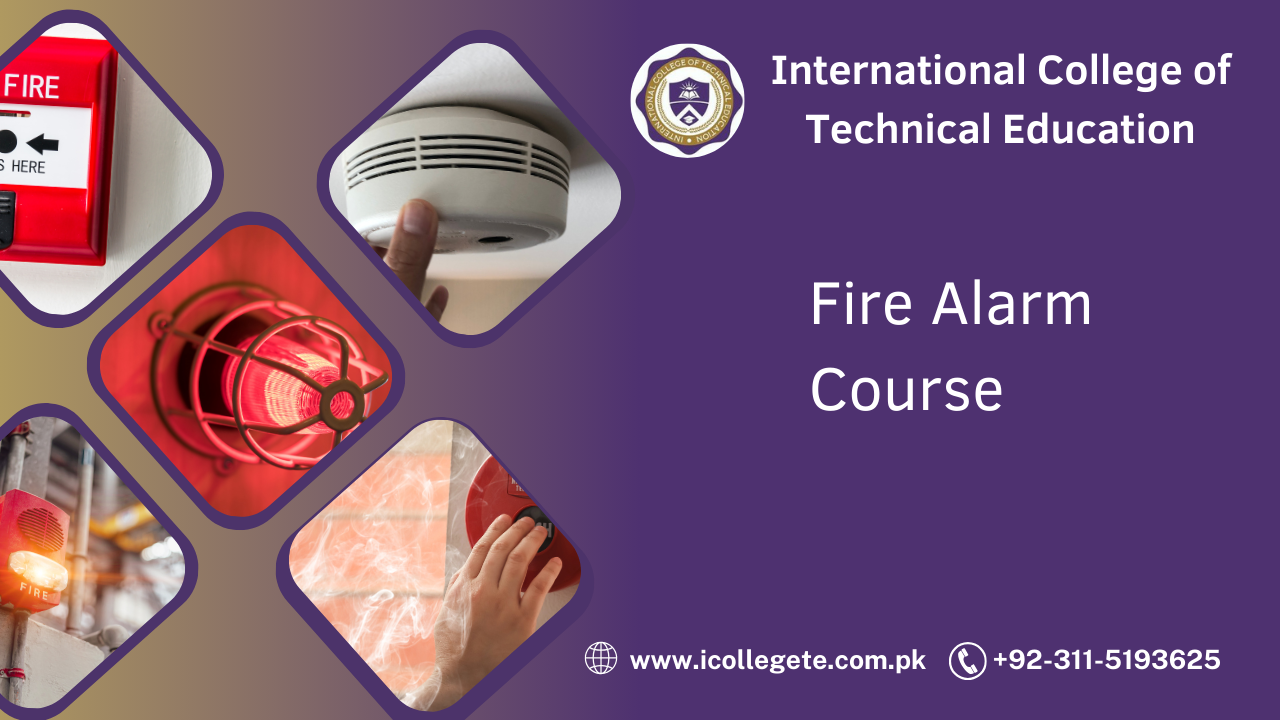Fire safety is one of the most critical aspects of building and workplace safety, and fire alarm systems play a key role in ensuring early detection and prevention of fire hazards. In Islamabad, the demand for skilled professionals in fire safety and alarm systems is increasing, as both residential and commercial properties are keen to meet safety regulations and safeguard lives and property. If you’re interested in building a career in fire safety, a Fire Alarm Course in Islamabad is an excellent way to gain specialized knowledge and hands-on experience to become proficient in this essential field.
The Fire Alarm Course in Islamabad is designed to equip individuals with the technical knowledge and practical skills required to install, maintain, and troubleshoot fire alarm systems. As fire safety is a critical concern in every building, this course is aimed at providing comprehensive training to those looking to enhance their careers in building safety, electrical systems, or emergency response services. The course covers everything from the basics of fire alarm components to the most advanced techniques for fire detection and monitoring.
Course Overview
This course is structured to cover both theoretical and practical aspects of fire alarm systems. It offers in-depth training on the types of fire alarms, how to install them, how they work, and how to troubleshoot common issues. You will also gain knowledge of fire safety regulations and standards, ensuring that your installations are compliant with the latest safety protocols. The course includes practical demonstrations and exercises, allowing you to gain hands-on experience with real fire alarm systems. By the end of the course, you will be equipped to manage fire alarm systems from installation to maintenance and troubleshooting.
Study Units
- Introduction to Fire Alarm Systems
- Basics of fire alarm systems and their importance in fire safety.
- Components of a fire alarm system: detectors, alarms, control panels, and notification systems.
- Types of fire alarms and detection technologies (smoke, heat, flame, etc.).
- Fire Safety Regulations and Standards
- Understanding local fire safety regulations and international standards (NFPA, ISO, etc.).
- The role of fire alarms in building codes and regulations.
- Compliance requirements for various types of buildings.
- Installation and Wiring of Fire Alarm Systems
- Step-by-step installation process for fire alarm systems.
- Wiring techniques for detectors, control panels, and alarms.
- Testing and calibration of fire alarm components.
- Types of Fire Alarm Systems
- Conventional, addressable, and intelligent fire alarm systems.
- Choosing the right system for different buildings and environments.
- Installation considerations for residential, commercial, and industrial properties.
- Troubleshooting and Maintenance
- Identifying and diagnosing common issues with fire alarm systems.
- Preventive maintenance techniques to ensure system reliability.
- How to test fire alarms and ensure they are functioning correctly.
- Advanced Fire Alarm Technologies
- Integration of fire alarm systems with other building safety systems (sprinklers, security, etc.).
- Wireless fire alarm systems and IoT-based solutions.
- The future of fire alarm systems and emerging technologies.
- Fire Alarm System Testing and Commissioning
- Procedures for testing fire alarm systems before and after installation.
- Commissioning processes for ensuring the system is fully operational.
- Documentation and reporting for system testing and compliance.
- Emergency Procedures and Fire Safety Planning
- Role of fire alarm systems in emergency evacuation and alerting occupants.
- Developing fire safety plans and training personnel.
- Collaboration with fire services and first responders during an emergency.
Learning Outcomes
By the end of the Fire Alarm Course, you will:
- Understand the various types of fire alarm systems and their components.
- Be able to install, configure, and troubleshoot fire alarm systems.
- Be familiar with fire safety regulations and ensure compliance with building codes.
- Have hands-on experience in wiring and testing fire alarm systems.
- Gain proficiency in maintaining fire alarm systems and conducting regular checks.
- Be equipped to identify potential issues with fire alarm systems and provide solutions.
- Understand how to integrate fire alarm systems with other safety measures in buildings.
- Have the skills to commission and test fire alarm systems to ensure they meet safety standards.
Course Benefits
- In-Demand Skills: Fire alarm technicians and specialists are in high demand across various industries, from residential buildings to large-scale commercial projects.
- Career Advancement: Completing this course enhances your qualifications and opens doors to a wide range of career opportunities in fire safety, electrical services, building maintenance, and emergency response.
- Practical Experience: The course includes hands-on training, giving you real-world skills that are highly valued by employers.
- Compliance Knowledge: You will be well-versed in the latest fire safety regulations and standards, ensuring you can provide compliant and reliable installations and services.
- Job Satisfaction: Fire alarm professionals play a crucial role in protecting lives and property, making this a fulfilling and meaningful career choice.
- Entrepreneurship: With the right knowledge and skills, you can start your own fire alarm installation and maintenance business, offering services to a wide range of clients.
Who is This Course For?
The Fire Alarm Course is ideal for:
- Electrical Engineers and Technicians: Professionals in the electrical field who want to specialize in fire alarm systems.
- Building Maintenance Professionals: Those responsible for maintaining safety equipment in residential, commercial, or industrial buildings.
- Fire Safety Consultants: Individuals interested in providing fire safety solutions to businesses or residential complexes.
- Security System Installers: Professionals in the security field who want to add fire alarm installation to their skillset.
- Aspiring Entrepreneurs: Individuals looking to start their own fire alarm installation and maintenance business.
- Anyone Interested in Fire Safety: Individuals who have a passion for safety and wish to contribute to public safety through fire alarm systems.
Future Progression
After completing the Fire Alarm Course, there are several avenues for further growth and development in this field:
- Advanced Fire Safety Courses: You can pursue more specialized courses in fire safety, such as fire protection systems, sprinkler systems, or fire safety management.
- Certification in Fire Alarm Installation: Gain professional certifications, such as those from the National Fire Protection Association (NFPA) or other relevant bodies, to enhance your qualifications.
- Fire Safety Consultancy: With advanced knowledge, you could start a consultancy firm offering fire safety solutions and fire alarm system installations to clients.
- Project Management: Transition into managing large-scale fire safety installation projects or overseeing fire alarm system design and implementation in construction projects.
- Entrepreneurship: Launch your own fire alarm and safety services business, offering installation, maintenance, and consultation to residential, commercial, and industrial clients.
The Fire Alarm Course in Islamabad is a valuable training program for anyone interested in fire safety and alarm systems. This course offers a comprehensive understanding of fire alarm technologies, regulations, and maintenance practices, making it an ideal choice for professionals looking to advance their careers in this essential field. Whether you’re starting your career or seeking to specialize in fire alarm systems, this course provides the knowledge, hands-on experience, and certifications to help you succeed in protecting lives and property through effective fire safety solutions.






